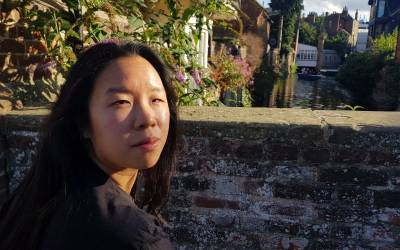Lauren, Conservation of Contemporary Art and Media MSc student at UCL East, shares her UCL experience. She is the recipient of a UCL East London scholarship.

What is the best aspect of studying at UCL East?
The facilities are wonderful, the conservation labs are well equipped to facilitate the examination and analysis of media and object-based artworks. The amount of study spaces with the buildings is also vast, meaning there is always somewhere to sit and work.
There’s such a range of spaces to experiment and learn in, and opportunities to pursue your own interests alongside your course. The new Institute of Making is by far the most exciting of the facilities. It will be such a privilege to have access to a space like that as I will be able to work with new materials as part of my course as well as work on personal projects there.
There are also opportunities to meet students outside of your programme and engage with the local community by taking optional modules run by departments other than yours. For example, ‘Sustainability and decision making’ within the Chemical Engineering Department or ‘Exploring Power, Inclusion and Exclusion with Local Communities’ within the Department of Psychology.
I also love the location. Our proximity to the Olympic Park means we’re surrounded by greenery and Hackney Wick is just a walk over the canal where you can go for food or drinks after class.
What made you choose the Conservation of Contemporary Art and Media MSc programme?
After studying Fine Art for my undergrad, I worked in sculpture fabrication and conservation, I found that the Conservation of Contemporary Art and Media MSc at UCL allows me to combine both my passion for hands-on work with my research interests. The course engages with current political, environmental and social debates within conservation which I knew would challenge and further my understanding.
The programme is taught by staff with a wealth of experience and knowledge of contemporary art conservation as well as technical and scientific understanding. I was really interested in pursuing a course where the teaching staff continue to work in their field, as this lets them maintain up-to-date knowledge on current issues. They have also been incredibly supportive and attentive to the needs, interests and skills of students within the programme.
The course also has excellent connections to the wider conservation sector. Guest lecturers throughout the modules have provided range and depth to the conversations and have been deeply engaging, covering topics such as neon art, analogue film and cleaning systems. We also visited conservation labs and this summer will embark on a work placement.
Although the course is in its first year it has exceeded my expectations and I look forward to the rest of the programme.
About UCL School for the Creative and Cultural Industries (SCCI)
The Conservation of Contemporary Art and Media MSc sits within UCL’s new School for the Creative and Cultural Industries (SCCI), linking teaching and research focused on art and creativity, technology, media, history, and collections and conservation.
All our programmes are interdisciplinary in nature and focused on enabling students to develop their critical thinking, creativity, and practical skills to engage with contemporary social and environmental challenges, and to prepare the next generation of practitioners for work in the creative and cultural sectors.
Students have access to accessible, state-of-the-art facilities. The site encourages collaboration across different disciplines, with hands on teaching and learning, offering students the opportunity to learn from each other, academics, and practitioners to shape the future of the cultural and creative industries.
 Close
Close

